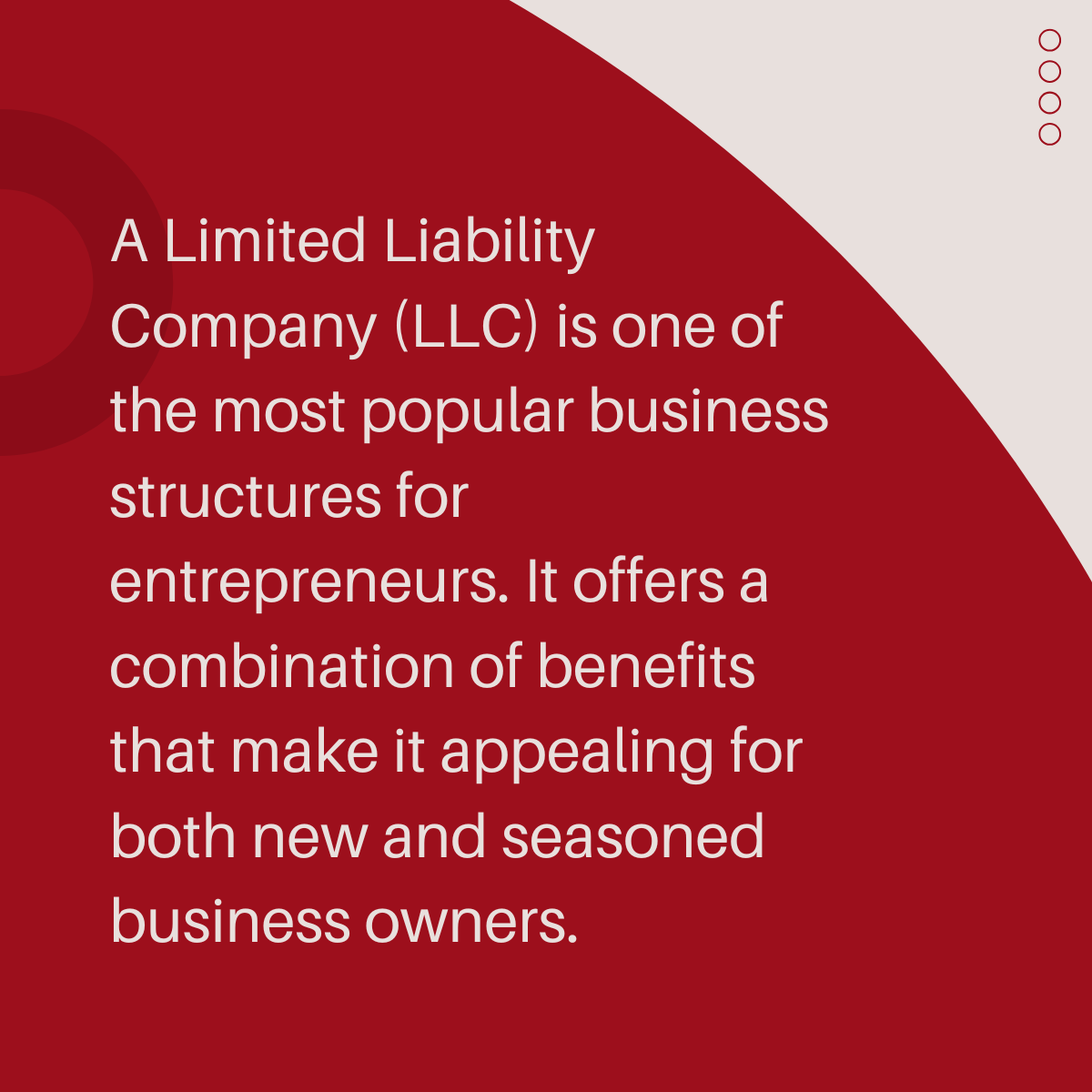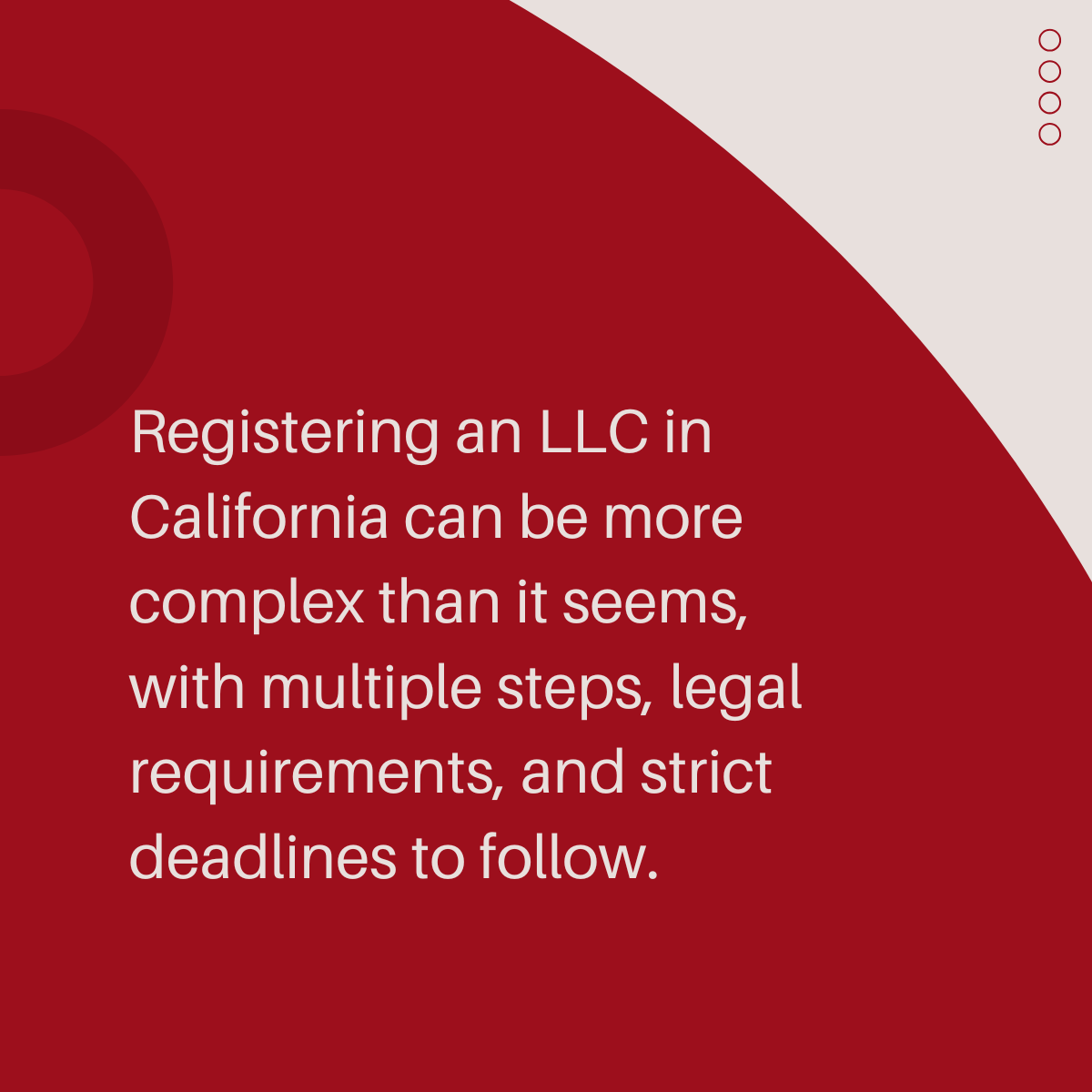
How to Create a New LLC in California
*THE INFORMATION INCLUDED IN THIS BLOG POST IS FOR INFORMATIONAL PURPOSES ONLY AND DOES NOT CONSTITUTE ADVERTISING, A SOLICITATION, OR LEGAL ADVICE, AND SHOULD NOT REPLACE YOUR CONSULTATION WITH A LAWYER CONCERNING YOUR PARTICULAR NEEDS*
Starting a business in California comes with endless opportunities, but the first step is often deciding how to structure it. For many entrepreneurs, forming a Limited Liability Company (LLC) is the perfect solution. It combines the flexibility of a sole proprietorship with the liability protections of a corporation. If you’re ready to take the leap, you’re probably wondering how to create a new LLC in California and what steps are involved.
The process is straightforward when you know what to do. From choosing the right name to filing the necessary paperwork, this guide will provide a high level walkthrough of some of the critical steps of the journey. Whether you’re a first-time business owner or expanding an existing venture, learning how to make an LLC is a crucial part of building your dream.
What is an LLC?
A Limited Liability Company (LLC) is one of the most popular business structures for entrepreneurs, and for good reason. It offers a combination of benefits that make it appealing for both new and seasoned business owners.
Before diving into the steps to create a new LLC in California, it’s important to understand what an LLC is and why it might be the right choice for you.
A Few of the Key Benefits of an LLC
- Limited Liability Protection: Unlike sole proprietorships or partnerships, an LLC separates your personal assets from your business liabilities. This means your personal savings, home, or other assets are generally protected from business debts or lawsuits.
- Flexibility in Management: LLCs offer more flexibility than corporations in how they’re managed. Owners (called members) can choose to manage the business themselves or appoint managers to handle operations.
- Tax Advantages: LLCs are considered “pass-through entities,” meaning profits and losses pass through to the owners’ personal tax returns, avoiding double taxation that corporations face. This “pass-through” tax application is the default tax option for LLCs.
How is an LLC Different from Other Business Structures?
- Compared to a Sole Proprietorship: An LLC can provide liability protection, while a sole proprietorship can leave personal assets at risk.
- Compared to a Corporation: Corporations have stricter regulations and more complex tax requirements, making LLCs a simpler option for small businesses.
By forming an LLC, you can enjoy the best of both worlds: the protection of a corporation and the simplicity of a sole proprietorship.

How to Create a New LLC in California
*THIS GUIDE SHOULD NOT REPLACE YOUR INDIVIDUAL REVIEW OF ALL REQUIREMENTS APPLICABLE TO YOUR INTENDED BUSINESS, OR CONSULTATION WITH AN ATTORNEY, WHEN CREATING A NEW LLC IN CALIFORNIA.*
1. Choose a Name for Your California LLC
Selecting a name for your LLC is the first step in bringing your business to life. California has specific naming laws you’ll need to follow. A few important considerations to keep in mind when choosing a name include:
- Ensure the Name is Unique
Your LLC’s name must be distinguishable from any other registered or reserved name in the California Secretary of State (SOS) records. Check the SOS business name database to confirm availability. This ensures compliance with California law (Cal. Corp. Code § 17701.08). - Name Compliance
Depending on the type of business that you wish to engage in, California may have unique naming requirements that must be complied with. Particular attention should be given to California law that is applicable to your intended business.
- Include an Entity Designator
The name must include “Limited Liability Company,” “L.L.C.,” or “LLC.” Abbreviations like “Ltd.” or “Co.” can be used for “Limited” and “Company.” - Optional Name Reservation
If you’re not ready to register but want to secure a name, you can reserve it for up to 60 days for a $10 fee. File your Name Reservation Request online or by mail via bizfile Online. Please consult with the California Secretary of State’s website to confirm any changes to the reservation hold period or fee. - Using a Fictitious Business Name (DBA)
If you plan to operate under a different name than your LLC’s legal name, you’ll need to file a fictitious business name (DBA) statement with your local county recorder where your business is located and operates. You will typically be required to also publish the DBA in a local newspaper for four weeks and renew it every five years. Please consult with the local county recorder where your DBA was filed to ensure compliance.
2. Choose a California Registered Agent
Every LLC in California is required to designate a registered agent. This individual or certified corporation acts as the point of contact for legal and tax documents.
- Who Can Be a Registered Agent?
The agent must have a physical address in California (P.O. boxes are not allowed). They can be a member, manager, or officer of the LLC, or a third-party service. - Why a Registered Agent is Critical
A registered agent ensures your LLC stays compliant with legal processes and deadlines, making them essential for smooth operations. - Commercial Registered Agents
If you prefer not to serve as your own agent, California maintains a list of registered agent services for hire.
3. Decide on Management Structure
Before filing your LLC, decide whether it will be member-managed or manager-managed:
- Member-Managed LLC
In this setup, all members (owners) actively participate in the day-to-day operations of the business. This is common for small businesses. - Manager-Managed LLC
For larger or more complex LLCs, members can appoint a manager or management team. Managers oversee significant decisions and operations, similar to a board of directors in a corporation.
4. File Articles of Organization
Filing Articles of Organization officially registers your LLC with the California Secretary of State. In addition to any other California requirements and permissible articles, the following should be included in your filing:
- The LLC’s name and principal address.
- The name and address of your registered agent.
- Whether the LLC is member-managed or manager-managed.
- A statement confirming the LLC is organized for lawful purposes.
You can file online, in person, or by mail via Form LLC-1. The filing fee is $70, with additional fees for expedited processing. Please consult with the California Secretary of State’s website to confirm any changes to the filing process or fee.

Source: Freepik
5. Prepare an Operating Agreement
California requires every LLC to have an operating agreement, even if it’s a single-member LLC. This document governs how your business is run and ensures legal compliance.
- A Few of the Key Elements that Should be Included
- Member roles and responsibilities.
- Ownership percentages and profit distribution.
- Procedures for voting, decision-making, and resolving disputes.
- Rules for adding or removing members.
Although the operating agreement is not filed with the state, it’s essential for preserving your LLC’s limited liability status and defining the internal structure.
6. File Initial and Biennial Reports
Every LLC must file a Statement of Information (Form LLC-12) with the SOS:
- Initial Filing: Submit Form LLC-12 within 90 days of filing your Articles of Organization.
- Biennial Filing: After the initial report, file a Statement of Information every two years. The filing window spans the month your LLC was registered and the previous five months.
The filing fee is $20, with an additional $15 for in-person submissions. Please consult with the California Secretary of State’s website to confirm any changes to the filing process or fee.
7. Comply with Tax and Regulatory Requirements
- Obtain an EIN
An EIN (Employer Identification Number) is necessary for tax filings, opening a business bank account, and hiring employees. Single-member LLCs also need an EIN if electing corporate tax status or employing workers. - Annual Franchise Tax
California LLCs must pay an annual minimum franchise tax of $800. File Form 3522 with the Franchise Tax Board to submit your payment. Additional fees apply for LLCs with income over specific thresholds. Please consult with the California Franchise Tax Board’s website, or a licensed tax individual, to confirm any changes to the filing process, including additional requirements, or fee. - Business Licenses and Permits
Depending on your industry and location, you may need local or state permits. Using the CalGold tool on California’s Office of Business and Economic Development website to assist in determining your requirements can be beneficial. - Sales and Employment Taxes
Register with the California Department of Tax and Fee Administration for sales tax collection, and with the Employment Development Department (EDD) if hiring employees.
In addition to, or distinguished from the above, depending on your particular business and activities, there may be different and/or additional tax and regulatory requirements. Please ensure that the correct resources are utilized to confirm all requirements applicable to your business are met.
How Long Does It Take to Register an LLC in California?
The time it takes to register an LLC in California depends on how and where you file your paperwork. While the process is relatively straightforward, there are several factors that can impact the timeline.
Standard Processing Times
When filing your Articles of Organization (Form LLC-1) with the California Secretary of State, the standard processing times vary based on the method you choose:
- Online Filing: Typically processed within 3–5 business days.
- Mail Filing: Can take 7–10 business days, depending on mail transit and workload at the Secretary of State’s office.
- In-Person Filing: Generally processed faster than mail but still subject to availability and workload.
Once your Articles of Organization are approved, you’ll receive a stamped copy, officially registering your LLC.
Expedited Processing Options
If you need your LLC registered quickly, California offers expedited processing for an additional fee:
- 24-Hour Processing: Costs an additional $350 on top of the $70 filing fee.
- Same-Day Service: Available for filings submitted in person before 9:30 AM, with an additional $750 fee.
- 4-Hour Processing: Available for filings submitted in person by 2 PM, with an additional $500 fee.
These options are ideal for business owners who need to register their LLC on a tight timeline. Please consult with the California Secretary of State’s website to confirm any changes to the filing process or expedited fee.

Why You Need a Business Lawyer to Help Register Your LLC
Registering an LLC in California can be more complex than it seems, with multiple steps, legal requirements, and strict deadlines to follow. Missing even one small detail, like an incomplete filing or a forgotten report, can result in delays, penalties, or even rejected paperwork. A business lawyer ensures that the entire process is handled smoothly, giving you confidence that nothing will be overlooked.
From drafting a customized operating agreement to navigating tax obligations like California’s annual franchise tax, a lawyer can adapt the process to fit your unique business needs. Their expertise not only saves time but also helps you avoid costly errors, so you can focus on launching and growing your business with peace of mind.
Contact us Today
At DMAB, our experienced business lawyers in Carlsbad specialize in helping entrepreneurs and small businesses navigate California’s legal landscape. Contact us today to schedule a consultation. Our experienced lawyers can assist you with forming your LLC and will support you in starting your business on the right track.
